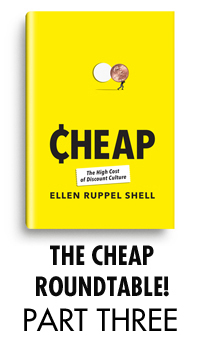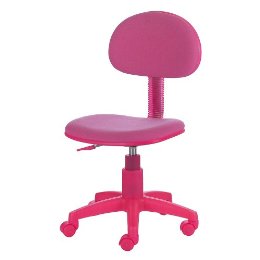(This is the third of a five-part roundtable discussion of Ellen Ruppel Shell’s Cheap: The High Cost of Discount Culture. Other installments: Part One, Part Two, Part Four, and Part Five.)
Jackson West writes:
 Sadly, like Kathleen, I wasn’t particularly surprised by many of the examples used in Cheap. However, unlike Kathleen, I’m a bit of a bargain hunting hobbyist — mostly in the realm of clothes, food and media. Because, as many of you know, writing isn’t exactly the quickest way to riches these days (if it ever was). Maybe if I wrote something to shake the moral and ethical foundations of your typical NPR-listening, Prius-driving IKEA and Whole Foods shopper I’d have more money lying around to spend on handmade furniture, bespoke suits, grass-fed beef and sustainably grown potatoes.
Sadly, like Kathleen, I wasn’t particularly surprised by many of the examples used in Cheap. However, unlike Kathleen, I’m a bit of a bargain hunting hobbyist — mostly in the realm of clothes, food and media. Because, as many of you know, writing isn’t exactly the quickest way to riches these days (if it ever was). Maybe if I wrote something to shake the moral and ethical foundations of your typical NPR-listening, Prius-driving IKEA and Whole Foods shopper I’d have more money lying around to spend on handmade furniture, bespoke suits, grass-fed beef and sustainably grown potatoes.
I’d certainly like to consider Cheap in the context of other well-meaning, non-fiction journalism. It’s likely to find itself sharing “Customers who bought this book also purchased” space on Amazon with a number of books. Barbara Ehrenreich comes to mind, as does Michael Pollan, whom I’ve been devouring of late. What all of them do is essentially describe the symptoms of the illness called “industrial capitalism,” but none of them seem willing to take their critiques quite that far. And, unfortunately, the suggested reforms do seem backward looking.
Contrast that approach with the pro-capitalist arguments put forward in Chris Anderson’s Free and Virgina Postrel’s The Substance of Style. Anderson naturally celebrates the creative destruction Ruppel Shell laments, even though I’d love to see his face when his publisher decides that, if free is good enough for everyone else, it should be good enough for Anderson. Therefore, no checks will be forthcoming.
 Postrel argues that the despicably produced furniture from the likes of Target is valuable, because of the aesthetic thought that went into the plastic mold. She goes on to write that a world of disposable plastic luxury in bright colors and pleasing curves is a beautiful and dynamic one; that the clever packaging and marketing that surrounds a fast-food hamburger and the medical technology developed to cure the heart attacks or the diabetes it gives you are both boons. To suggest otherwise makes you hopelessly backward.
Postrel argues that the despicably produced furniture from the likes of Target is valuable, because of the aesthetic thought that went into the plastic mold. She goes on to write that a world of disposable plastic luxury in bright colors and pleasing curves is a beautiful and dynamic one; that the clever packaging and marketing that surrounds a fast-food hamburger and the medical technology developed to cure the heart attacks or the diabetes it gives you are both boons. To suggest otherwise makes you hopelessly backward.
That’s what frustrated me so much about Cheap‘s ending. While it wasn’t a Pangloss like Anderson or Postrel, Ruppel Shell had a chance to draw a conclusion that indicted the philosophy of industrial capitalism, but instead quoted Adam Smith — and in so doing, seemed a tad the naive Candide. Because the essential problem with all the cheap crap which these markets bring us and the depredations that it took to get them here formed an ecology in which we, the working (or, these days, maybe working) class, are trapped.
Which belies any of Ruppel Shell’s advice to make the personal choice of “opting out” of the system by changing my shopping habits. Because I must “buy in” to have any purchasing power at all. Now that capitalism is truly global, there is nowhere to escape — except, of course, into wealth. And the only way to get there is by wholly embracing the ideology that got us here in the first place. Namely, to put private profit and property above all, and damn the torpedoes.
Now Ruppel Shell is right in that Smith’s self-interest was supposed to be an “enlightened” one — not necessarily strictly rational, as he is usually misquoted, or the more naked self-interest which it has devolved into with practice. But Smith lived in a time and a place wholly different from our own. And as Ruppell Shell rightly points out, ours is a time in which we’ve made our ignorance of the true costs of our goods willful. We’ve hidden these costs behind trans-continental shipping and propaganda quite literally engineered through mind mapping, helping to fool our senses and reason.
Present Smith with the blinding fluorescent and neon light come-ons, and I bet he too would fail to perceive the dark age that lurks behind what lies just outside his field of vision.
What I’ve gathered from the likes of Cheap is yet another indication that, until there is a way to account for such externalizations like environmental degradation and human suffering, there’s no end in sight. Capitalism by its very nature seeks to commodify through efficiencies of scale, quantify through market pricing, and exact measurement and monopolize by granting private ownership of anything and everything — from DNA to the very air we breathe. So I find it ironic that a book that revels in the revelations of excess and hubris would return to the words of the system’s moral benefactor and apologist.
Apologies to Peggy, but I’m going to have to disagree that all revolutions end poorly — after all, as we were all so loudly reminded yesterday, July 4th, ours was a nation born of fire and steel and “Death to Tyrants.” Though, naturally, that revolution ended with us right here debating this. So maybe you’re right after all.
 But at least revolutions happen at the time and choosing of the revolutionaries. What worries me about the current spate of liberal hand-wringing in books like Cheap is that in not calling for a wholesale rethought of our political and economic organization, in only urging personal responsibility and institutional reform, we’re simply not going to act fast enough to avoid a catastrophic reckoning. Because I have a bad feeling that all the “hidden costs” we’ve been charging to the bank of the future are being added up on some terrible ledger, and we will all have to pay for them eventually.
But at least revolutions happen at the time and choosing of the revolutionaries. What worries me about the current spate of liberal hand-wringing in books like Cheap is that in not calling for a wholesale rethought of our political and economic organization, in only urging personal responsibility and institutional reform, we’re simply not going to act fast enough to avoid a catastrophic reckoning. Because I have a bad feeling that all the “hidden costs” we’ve been charging to the bank of the future are being added up on some terrible ledger, and we will all have to pay for them eventually.
Call me a pessimist, but I just don’t see the kinder, gentler postindustrial capitalism Ruppel Shell calls for ever materializing. At least not until the oil runs out and the climate changes and we’re all totally fucked, regardless.
Colleen Mondor writes:
You know, when I signed up for this round table I never thought the discussion would totally suck the life out of me. And yet it is. I just don’t agree that the situation is that bad – or that it is has crossed a line to prevent positive change. At least we are all now talking about cheap products and fast food and agribusiness, etc. Twenty years ago these topics were not part of the national conversation. When I grew up in the ’70s, TV dinners were good. So were plastic bags and Styrofoam. Twenty years before that, spraying DDT on crops was good. Heck, in the ’60s, my husband went to an elementary school with asbestos in the walls. But we learn. We discuss. Books are published. Studies are completed. And change does come. Does Cheap go far enough for everyone? Probably not. But it does go far for the general reader. Hopefully, just as we all embraced Fast Food Nation and other titles (Pollan included), we will find something of value in Ruppell Shell’s work as well.
It’s easy to say that things will never change. I give the author credit for pointing out reasons why she thinks change should happen and for writing a book that does not intimidate readers from asking themselves questions about why they think it should. Getting general readers curious about the economy is no simple task and while many members of this roundtable might already know what Cheap is about, I’m sure there will be a lot of readers who find something new in her discussion.
Sarah Weinman writes:
Let’s keep this in mind: One person’s “I’ve heard it all before” is another person’s mind being blown when hearing such ideas for the very first time. One person’s bitter pessimism is another person’s stubborn optimism. And maybe, just maybe, we’re talking more about class division in terms of how we’re approaching Ruppel Shell’s approach? But I admit, those are fighting words. Just as Jackson’s tipoff to the “moral and ethical foundations of your typical NPR-listening, Prius-driving IKEA and Whole Foods shopper” might be as well.
But let me backtrack a bit, since I haven’t really delved into my thoughts on Cheap more readily. Unfortunately, I don’t have the book in front of me. So I’m going to have to rely on memory. My take falls a lot closer to the mind-blown newbie than the jaded repeat listener, largely because, to misquote the Passover Seder in gross fashion, “in every generation you must act as if you personally had been brought out of Egypt.” Point being, Ruppel Shell’s examples aren’t new. Certainly not to me. But isn’t there some power in her having gone to Sweden to visit IKEA headquarters, or personally experiencing Vegas outlet mall shopping, and so on and so forth? Examples are just a means of finding the right way to frame an idea, a thesis, or an investigation. And while I had some of the same problems about Ruppel Shell’s conclusions, because the end of Cheap felt more than a bit rushed and frantic compared to the cool-as-cucumber research and investigation of earlier chapters, I was more than convinced by her own discoveries, her own personal approach to supposedly common problems, and, most of all, the questions that formed in my mind, independently, in agreement or disagreement — as a result of what she wrote.
 As Colleen said, we’re talking about issues now that wouldn’t have registered in the slightest during the advertising boom of the ’60s, the gas guzzling years of the ’70s (crisis notwithstanding), the Me Generation ’80s, and even the ’90s, which sure look like a happy boom period from 2009. Maybe Cheap isn’t Silent Spring or Unsafe at Any Speed or even Fast Food Nation, but so what? For me, it passed many smell tests: There was (a) well-thought out, sourced, journalism of originality, (b) a clear, distinct voice, and (c) at least some attempt at problem-solving. And ultimately, there is absolutely no harm in repeating ideas you “know” about from a different angle or a new slant. Because maybe, just maybe, it will register and resonate and hit home. Need I bring up the adage about how many times we have to see an ad before it registers? Or other market research stats on the branding and corporate mentality propping up the lowest-price-is-best mantra? I know I’ve read any number of articles on any number of subjects and all it takes is one read at one time in one place for something to “click” in place, to get me thinking at a deeper level. Such are the goals of a book like Cheap and, as a result, it succeeded for me.
As Colleen said, we’re talking about issues now that wouldn’t have registered in the slightest during the advertising boom of the ’60s, the gas guzzling years of the ’70s (crisis notwithstanding), the Me Generation ’80s, and even the ’90s, which sure look like a happy boom period from 2009. Maybe Cheap isn’t Silent Spring or Unsafe at Any Speed or even Fast Food Nation, but so what? For me, it passed many smell tests: There was (a) well-thought out, sourced, journalism of originality, (b) a clear, distinct voice, and (c) at least some attempt at problem-solving. And ultimately, there is absolutely no harm in repeating ideas you “know” about from a different angle or a new slant. Because maybe, just maybe, it will register and resonate and hit home. Need I bring up the adage about how many times we have to see an ad before it registers? Or other market research stats on the branding and corporate mentality propping up the lowest-price-is-best mantra? I know I’ve read any number of articles on any number of subjects and all it takes is one read at one time in one place for something to “click” in place, to get me thinking at a deeper level. Such are the goals of a book like Cheap and, as a result, it succeeded for me.
But I want to talk about the book itself and specifically, a topic that wasn’t addressed but which I thought about constantly as I read it: digital books and how to price them. I too wish Amazon had been given larger shrift, but figured Ruppel Shell didn’t have the space or felt she had to restrict herself to a given number of examples for narrative purposes. But since she didn’t, I could fill in my own blanks. $9.99 is just as mythical a set point as any number of cheaper or expensive prices are for goods, and when someone is willing to pay much more for an iPhone or a Kindle or the device that you’d read a digital book on, but the book itself is too “costly” when it’s more than $10 (consider the Amazon message board petition to boycott eBooks priced higher! I wish I had the link handy but others have found it) and we run into dangerous territory. I think eBooks should be cheaper than hardcovers for sure, just like mass market paperbacks should be cheaper. But what of the cost of producing a book, the advance/author payment, the editorial and production work? Should that always be a money-losing venture? And if eBooks are cheap and there is no physical value and they disappear because of DRM issues, then what? Is there value? Is it an object or a work of art or commercial pap or all of the above? I want my books to have value, but maybe the folks who sold to the pulps wanted them to as well, but had to settle for being paid at a penny a word or for signing away the rights for a few thousand bucks to lose control over everything but the words on the typewritten page, if that.
Cheap, to me, is a jumping off point, not the last word. I sure hope it’s not the last word, because then Ruppel Shell would have failed in her mission, but judging by the word count of this roundtable so far, I’d say it’s anything but.
Whet Moser writes:
Apologies for taking so long to write. I was on the road for the 4th, which is never as unstressful as it’s intended to be.
I remember the first time that I went to IKEA, thinking, “My family would kill me if they knew.” My dad used to work in the southern furniture industry (which is getting killed by imports), before getting laid off. His father had a part-time business making custom furniture, which took months or years to make and cost tens of thousands of dollars, as well as another part-time business making custom wood powerboats. His father ran a furniture business that specialized in expensive, handmade, archetypal southern furniture.
So the book hit me in a personal way, and made me question whether I’m part of the problem. But I had to weigh that against the realities of my life, as compared to the generations that preceding my own. Virtually no one in my family moved out of the state they were born in. Not only did I move to a big city for college, but I’ve lived in four different apartments since I graduated six years ago. Most of my family, if they went to college, went to state schools. I went to an expensive private school in another state, and will be paying for it well into middle age, in order to make an entry-level salary with less purchasing power than my family had back in the day. IKEA, for better or worse, has been a godsend in some ways, as it was to Levi Asher above.
I’d love to be able to support the sort of craft that Ruppell Shell describes, but it’s a slow process: Between declining purchasing power, an increased debt load, a longer workday, and my locally peripatetic lifestyle, the “cheap” products that Ruppel Shell describes are appealing for reasons beyond price, which is something to factor in (and she does a fine job of it in the IKEA chapter).
Along those lines, here are responses to discussion points that I thought were interesting:
“What worries me about the current spate of liberal hand-wringing in books like Cheap is that in not calling for a wholesale rethought of our political and economic organization, in only urging personal responsibility and institutional reform, we’re simply not going to act fast enough to avoid a catastrophic reckoning.” (Jackson West)
As an editor/blogger/etc., I’m really only good at thinking about these concerns in terms of how they’re discussed within that realm. So I can’t offer much help on wholesale rethought. But one area where I do think progress is being made is in food, as evidenced not only by Pollan/Food Inc./etc., but also just in terms of local food. Here in Chicago, it’s a big thing, as you’re probably aware. And it’s a shame that other forms of craft aren’t discussed in the same terms, e.g., people freaking out over a local furniture maker in the way they do over Moto or a new restaurant from the people behind Lula (if you’re in Chicago on a Monday, Lula’s farm dinner is the best thing in town).
People in my not-particularly-impressive financial demographic are willing to pay a premium for craft in terms of food – but not a lot of other things. I don’t have an explanation. I think it’s just one of those things. But I think it’s a good model.
Here’s one honorable example in a related field: Lifehacker may be my favorite blog. Give it a shot, if you haven’t. It’s mostly computer-oriented, but the bloggers also touch on food, time management, etc. It’s about how to do things efficiently and wisely, particularly getting the most out of expensive electronic gadgets. There isn’t a lot pertaining to the subject at hand, but I’d like to see Lifehacker’s philosophy get picked up by other bloggers and newspapers.
“How do we get from our current system, in which the hidden costs are catching up and twisting us into a vicious downward spiral in all areas, to a more equitable system, in which price reflects real cost, and local/sustainable is the more economical option? In other words, how do we get to Utopia?” (Peggy Nelson)
This is one hell of a hard question that the book doesn’t really ask or answer. Short of making the production process part of your advertising campaign (after reading Cheap, I bought some $14 American Apparel undies — they are quite comfortable), it’s difficult to tell whether a high price is a brand premium, the actual cost of something made honorably, or just an insane profit margin.
Part of me thinks consumers need better informational resources. But the local papers seem more interested in whatever scheme McDonalds has cooked up (they are Oak Brook based, but c’mon). Again, I turn to Lifehacker: If you want more wisdom about consuming and using what you consume. I know a lot of stuff. But if I need new shoes, I have no idea where to begin if I want to take some care in surveying their origins.
My biggest beef with the book: She picks up and drops Nick Kristof’s argument about how you should buy sweatshop-produced goods because it represents an improvement for the laborers over the alternative. Unfortunately I haven’t read Kristof’s own argument. So I don’t know how glib his argument or Shell’s description of it is.
But I think it’s a question that deserves some serious thinking. As a Virginian well-versed in Appalachian history, I’m painfully aware that the guaranteed “living wage” that Americans were promised isn’t that far removed from the economic exploitation that made things cheap back in the day. Demands for non-exploitative labor, at least in the U.S., are a comparatively new thing. We had to go through a long, bloody labor history to even get where we are now.
Here’s a related book that’s awesome: Free Lunch by the great David Cay Johnston. It really fleshes out the governmental advantages that “cheap” big box stores receive. It’s not just that they have structural advantages. They also lobby like hell.
Miracle Jones writes:
Whet, I brought up some of IKEA’s sins over dinner with my roommate over the weekend, and she put her fork down and glared at me.
“Without IKEA, it would be impossible for a single woman to move without help. They make disposable furniture for disposable living arrangements.”
I shrugged and mentioned something about trees, but she knows I don’t give a shit about trees. So maybe you are right.
Sarah, I don’t know if this book will be eye-opening at all. It feels like the kind of soothing head massage that actually shuts eyes. Much of this book instead felt like a letter from a fretful, middle-class parent to their affable, cloistered child just entering adult life, a letter about the real value of things. The sort of letter you would hear read aloud in a Wegmans commercial.
by Miracle Jones
1. Admit you are poor. It’s easiest to admit this to another poor person. Chances are they live next door to you. Maybe this is a good time to meet your neighbors.
2. Get cool with being poor. Realize that what you are is actually “normal.” Go outside. Let a pit bull lick your hand, take a deep breath, and say: “I make under a thousand dollars every month just like most human beings on this planet, if not America. The true human condition is to make under a thousand dollars a month and still live, fuck, breed, laugh, create, eat, dance, bleed, and die. There is nothing noble about this and nothing wrong with it either. How can it be anything other than baseline?”
 3. Most of the money you make every month will go to rent. This is a necessity. If you are homeless, you will get fired from your “job” or you will get jumped so often that you will become a paranoid wreck. Try to get more roommates, if you can’t hack rent. Learn to live with couples. Don’t listen to bearded weirdos who tell you homelessness is the true freedom. Being homeless feels “free” for exactly three days, and then you start to hate all of humanity, including yourself, which is more stressful than a full-time job.
3. Most of the money you make every month will go to rent. This is a necessity. If you are homeless, you will get fired from your “job” or you will get jumped so often that you will become a paranoid wreck. Try to get more roommates, if you can’t hack rent. Learn to live with couples. Don’t listen to bearded weirdos who tell you homelessness is the true freedom. Being homeless feels “free” for exactly three days, and then you start to hate all of humanity, including yourself, which is more stressful than a full-time job.
4. Get a job for at least six months working in the kitchen of a restaurant where you like the food. Learn how to cook cheap shit using cheap ingredients. Learn how to run your own household with the same tightwad attention to inventory management as a short-order line cook. Treat yourself as both tyrannical boss and a tyrannical customer when you start cooking for yourself at home. Hopefully your roommates are also experimenting with this form of culinary school and you can pool knowledge to make endless, fascinating feasts. NOTE: It is much easier to get laid by cooking for somebody than taking them to a restaurant. You are already in a private place with a bed.
5. Get a job for at least six months in the service industry where you have to sell something to people, preferably something that you like but that you don’t really need. Get the job for the discount and stock up! Sell the item using every sleazy sales trick you can think of. Become immune to these tricks. Make friends with other people in service industry jobs in order to learn the true value of the products you sell. Step sideways from the consumer mentality by taking the Devil into you and learning how the Devil gets souls. HINT: It’s not by lies, it’s by false correlation.
6. Steal things if you know you will not get caught. Go ahead. You have my permission (this will not hold up in court). “Get hold of portable property!” Property acquires possessions, not people. Steal from where you work. Steal a lot from where you work. It’s called “shrinkage.” It’s all insured. Don’t get caught. Learn how not to get caught, even if you have morals that preclude actual crime. Give free shit to your friends and roommates when they come visit you. Visit them where they work. Get free shit from them.
 7. Get rid of your television. Forever. Watching rich people whine is no kind of entertainment for a normal person such as yourself.
7. Get rid of your television. Forever. Watching rich people whine is no kind of entertainment for a normal person such as yourself.
8. Sex, conversation, art, and games are what actually make people happy. All advertising points back to these free phenomena and tries to tap into their power. If you are thoroughly modern and you start to see items as information instead of as special physical curios, you will start to get bored by everything you can’t steal easily or produce yourself. Handmade goods are only meaningful when the hands that make those goods are your own. The internet has recipes for everything, from delicious marijuana cookies to beautiful homemade books. Learn to value things by the amount of time it would take you to make them yourself at home. Egg McMuffins = EXPENSIVE. Crepes and blueberries = CHEAP.
Become cheap. Don’t fight it. Go so deep into cheap that you become competition for these eeeeeevil discounters. Become so cheap that you are affordable to everybody in all your favorite activities (sex, conversation, games, art), both rich and poor alike. You will have a good life.
Eat gross-ass blood shrimp, but only have a handful as you scrape someone else’s plate in the back of a restaurant and then wash it. That is truly “affordable luxury.”
[…] (This is the second of a five-part roundtable discussion of Ellen Ruppel Shell’s Cheap: The High Cost of Discount Culture. Other installments: Part One and Part Three.) […]
Very funny!
[…] discussion with several thoughtful people, which you can investigate here: Part One, Part Two, Part Three, Part Four, and Part […]
I’ve been thinking about this and I just want to make some comments about Miracle Jones’ “How to Live Cheap”.
First off: stealing is wrong. Stealing is always wrong. But you say, oh it’s insured or oh, I’m stealing from a big corporation. No. Fuck you. Stealing is fucking wrong.
Second off: “Sell the item using every sleazy sales trick you can think of.” This may be even worse than stealing. There is no excuse for behaving like an asshole. I know you think anyone who makes more money than you has it coming or something, but fucking over other people is being an immoral dick. Sorry.
There are basic ethical questions at play here.
“Stealing is wrong.” Says the man with numerous “borrowed” eBooks on his Sony E-Reader. (I’m just saying.)
copying is not stealing. I don’t care what the corporations would have you believe, if I’m not taking something away from someone else I’m not stealing, and calling it stealing should be patently obvious bullshit.
[…] Ruppel Shell’s Cheap: The High Cost of Discount Culture. Other installments: Part One, Part Two, Part Three, and Part […]